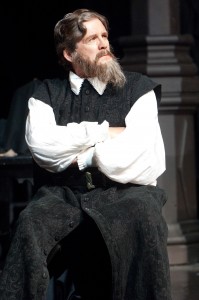
Yes, it’s true. Mr. Scatter has been missing from action for some time now. Perhaps you’ve noticed. He doesn’t go out, he never calls his friends, he ignores his children, he lets the dirty dishes sit in the sink, he NEVER WRITES. Yada yada yada.
Truth is, he did not go to meditate in the woods, and the bears didn’t eat him. It’s just that he’s been carrying this thing on his back — let’s call it the Modestly Big Project, or MBP — that’s been screaming for his attention and keeping him from his normal rounds. Or at least, keeping him from writing about his normal rounds.
So let’s catch up.
Yesterday Mr. Scatter tucked the MBP’s head on a pillow for a much-needed rest and took a whirl in his modest white automobile to the grocery emporium. On the way he realized he wouldn’t mind a cup of coffee — a nice cafe au lait crossed his mind — and maybe a little pastry-ish thingie to go with it. He spotted a likely-looking spot in a Neighborhood of Aspiring Hipness and swung in.
Almost immediately Mr. Scatter realized he did not meet the establishment’s cool-factor code. Despite his flannel-lined jeans and disintegrating shoes, he was insufficiently slack. His head was conspicuously neat from a two-day-old haircut, and not only was the shirt he happened to be wearing tucked in, it also had a collar with little brown buttons at the tips. They were actually buttoned.
“You gonna have that for here?” the whelp at the counter inquired, in a tone that conveyed his sincere hope otherwise. Mr. Scatter stood his ground, and found a table, and picked up a copy of a small local publication called Willamette Week. Soon he found himself chuckling.
He was reading a review by Aaron Mesh of the new Harrison Ford/Brendan Fraser movie Extraordinary Measures, which was apparently filmed in Portland, and Mr. Mesh had struck an exquisite balance between gentle appreciation and the art of poking fun. He noted with approval Mr. Ford’s tendency to shout in irritation at pretty much any and everything. Mr. Scatter had already witnessed Mr. Ford doing just that, in television commercials for the movie, and it was a pretty scary sight. Reading about it was probably more fun than actually sitting through the film. And a whole lot more fun than the little coffee shop Mr. Scatter will not be visiting again.
Mr. Mesh’s review made Mr. Scatter feel a little better about the fate of dead trees, a gloomy topic that had come to mind earlier in the morning when he picked up his Oregonian and discovered, for the second time in four days, a front-page wraparound (it’s called a spadea in the biz) trumpeting the newspaper’s editorial-page objections to state Measures 66 and 67. We’re getting used to this form of advertising. If it’s a Fred Meyer ad, Mr. Scatter checks to see if there are any sales on things he usually buys, then dutifully deposits the thing in the recycling bin.
But this ad, featuring headlines and copy from The Oregonian itself, looked at first and even second glance not like an advertisement at all but like a front-page editorial endorsement. Mr. Scatter was actually shocked, if far from awed.
Wednesday’s version put the words “Paid Advertisement” in bigger and bolder print at the top, but it didn’t amount to much more than a better grade of wallpaper over the gaping hole in the newspaper’s ethical wall. The publisher’s argument that the spadea space was just as available to proponents as to opponents of the measures was disingenuous. Newspapers make qualitative decisions every day about what is and is not acceptable in advertising copy. At least, they used to. Nothing is more important to a newspaper than its reputation for integrity, which must be guarded zealously.
Mr. Scatter understands that these are difficult times for newspapers, but what these wraparounds cost The Oregonian in reputation was not worth the quick paycheck.
The answer is simple. Keep the spadea, but for commercial advertisers. Make the front-page wraparound unavailable for any political advertising, of any stripe, on any issue, from any source, at any time. Just say no.
***************
Since we last talked at any length Mr. Scatter has spent a little time in a town some miles south of Portland known to locals as “San Francisco.”
 He found it a pretty little place, with lots of hills and a pleasant small-town feel, and he particularly enjoyed a local delicacy of deep-fried crabmeat shaped into something like a drumstick and attached to a claw. Rumor has it that the dish has Chinese origins, although the crab itself was definitely Dungeness. In the evenings Mr. Scatter found himself shacked up in the shabby-chic splendor of the Queen Anne Hotel, near the crest of Sutter Street. The interior is like a giant overstuffed spangly cat toy that’s been knocked around a bit, and in its own way it’s really quite splendid. Mr. Scatter took a few shaky snapshots with his cell phone and sent them to Mrs. Scatter, who was amazed and envious.
He found it a pretty little place, with lots of hills and a pleasant small-town feel, and he particularly enjoyed a local delicacy of deep-fried crabmeat shaped into something like a drumstick and attached to a claw. Rumor has it that the dish has Chinese origins, although the crab itself was definitely Dungeness. In the evenings Mr. Scatter found himself shacked up in the shabby-chic splendor of the Queen Anne Hotel, near the crest of Sutter Street. The interior is like a giant overstuffed spangly cat toy that’s been knocked around a bit, and in its own way it’s really quite splendid. Mr. Scatter took a few shaky snapshots with his cell phone and sent them to Mrs. Scatter, who was amazed and envious.
***************
Several evenings ago Mr. Scatter escorted himself to the Newmark Theatre to see iChange, the latest show by the lively Polaris Dance Theatre. Polaris has been around quite a while but this was the first time Mr. Scatter had seen the company perform, and all in all it was a pleasant experience. Polaris has some good dancers who are dedicated to what they do, which is a highly accessible, very pop culture-oriented contemporary style of dancing, a little sexy but not raunchy, and just the sort of thing to attract enthusiastic initiates. Sort of like Fame a few years after graduation. Before and between performances the audience was invited to whip out its cell phones and send Tweets and other instant text messages, which were then posted on a large screen on the stage. Mr. Scatter refrained, but he didn’t mind the activity, which seemed quite popular in other seats.
Last night Mr. Scatter attended a meeting of the board of Portland Taiko, the excellent performing organization with which he is associated, and spoke with other august personages of Important Things.
This very evening, Thursday, he will motor to the World Forestry Center for White Bird‘s dance presentation by two of Portland’s finest, the cerebral Tere Mathern and the sinuous Minh Tran, who reveals to The Oregonian that these performances, through Sunday, will be his final as a dancer; he’ll move full-time into dancemaking instead.
On Friday night Mr. Scatter’s destination is Kaul Auditorium at Reed College for the latest show by Third Angle New Music Ensemble, the splendid troupe for whom Mrs. Scatter toils night and day. This will be an evening of mostly new works by several Northwest composers, and it has a literary theme: Narrators include the actors David Loftus and Michele Mariana, plus the distinguished Ursula K. LeGuin, reading her own story A Ride on the Red Mare’s Back to a score by Bryan Johanson. This is what’s known as the payoff.
Sunday afternoon, Mr. Scatter scampers to Artists Repertory Theatre to take in the premiere production of Susan Banyas‘s performance piece The Hillsboro Story, which hurtles us back to 1954 and a key moment — one that Ms. Banyas, as a third-grader in her Ohio home town, witnessed — in America’s civil rights movement.
If you happen to be at any of these events and spot Mr. Scatter wandering about, do say hello. He promises to leave the bear in the woods.

Photos, from top:
- Not Mr. Scatter, who actually never was lost in the woods. Not in recent years, anyway. This is a fragment of a 1903 lithograph, “Way to Sarov,” that depicts St. Serafim of Sarov communing with a friendly bear. Mr. Scatter would not do this thing. Wikimedia Commons.
- One curlicued corner from the spacious lobby of San Francisco’s Queen Anne Hotel, which is curly from its overstuffed stem to its overstuffed stern.
- Up against the wall: Polaris prepares to scale the heights. Photo: Brian McDonnell/BMAC Photography
 This time he was working, covering the event for The Oregonian, and it turned out to be remarkable — well worth twisting and ducking twelve blocks through the crowds and police blockades for the Rose Festival’s Starlight Parade. Mr. Scatter does not know if Ivory floats, but pretty much everything else in downtown Portland was either riding a float or watching from the sidewalk as the floats floated by.
This time he was working, covering the event for The Oregonian, and it turned out to be remarkable — well worth twisting and ducking twelve blocks through the crowds and police blockades for the Rose Festival’s Starlight Parade. Mr. Scatter does not know if Ivory floats, but pretty much everything else in downtown Portland was either riding a float or watching from the sidewalk as the floats floated by. Heald, the Broadway and Hollywood vet who gave it up to move to Ashland and join the acting company at the Oregon Shakespeare Festival, tells what prompted him to make the leap into relative obscurity, and why he’s happy as a clam about it. Heald is getting ready to open as Shylock in the festival’s new production of The Merchant of Venice. Interesting side note Marty dug up: Heald is the first Jewish actor ever to play the role on the festival stage.
Heald, the Broadway and Hollywood vet who gave it up to move to Ashland and join the acting company at the Oregon Shakespeare Festival, tells what prompted him to make the leap into relative obscurity, and why he’s happy as a clam about it. Heald is getting ready to open as Shylock in the festival’s new production of The Merchant of Venice. Interesting side note Marty dug up: Heald is the first Jewish actor ever to play the role on the festival stage. Between epic motorcycle trips and learned sessions with master brewers, Foyston’s been known to paint up a modest storm of his own. And Ken Dixon, who in the great long-ago wrote an occasional witty and perceptive art review for Mr. Scatter at a Large and Important Daily Publication, is a writer with a singular miniaturist approach to the puzzle of the written word. His books are wry and elegant, carefully measured for precise effect, and they maintain a sly satiric distance. At a time when the art world sometimes seems nearly strangled in a tangle of theory and jargon, even the name of Dixon’s artist-hero seems perfectly chosen: Christopher Freeze.
Between epic motorcycle trips and learned sessions with master brewers, Foyston’s been known to paint up a modest storm of his own. And Ken Dixon, who in the great long-ago wrote an occasional witty and perceptive art review for Mr. Scatter at a Large and Important Daily Publication, is a writer with a singular miniaturist approach to the puzzle of the written word. His books are wry and elegant, carefully measured for precise effect, and they maintain a sly satiric distance. At a time when the art world sometimes seems nearly strangled in a tangle of theory and jargon, even the name of Dixon’s artist-hero seems perfectly chosen: Christopher Freeze.
 He found it a pretty little place, with lots of hills and a pleasant small-town feel, and he particularly enjoyed a local delicacy of deep-fried crabmeat shaped into something like a drumstick and attached to a claw. Rumor has it that the dish has Chinese origins, although the crab itself was definitely Dungeness. In the evenings Mr. Scatter found himself shacked up in the shabby-chic splendor of the
He found it a pretty little place, with lots of hills and a pleasant small-town feel, and he particularly enjoyed a local delicacy of deep-fried crabmeat shaped into something like a drumstick and attached to a claw. Rumor has it that the dish has Chinese origins, although the crab itself was definitely Dungeness. In the evenings Mr. Scatter found himself shacked up in the shabby-chic splendor of the 